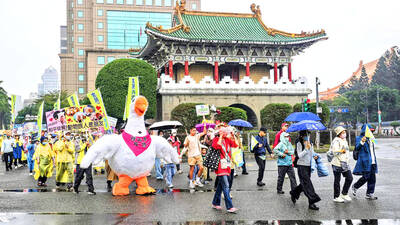The Japanese government plans to dispatch officials to four Asian locations, including Taiwan, later this month to brief the public about the imminent implementation of a fingerprinting policy at gateways to Japan, a Japanese daily reported yesterday.
The Mainichi Shimbun said that beginning Nov. 1, all foreign visitors will have their fingerprints taken at customs upon entering into Japan after an amendment to entrance management laws is brought into force. The amendment, aimed at keeping terrorists at bay, was passed by the Japanese Diet in 2004.
Officials from the Japanese Ministry of Justice are expected to visit Taiwan, Hong Kong, China and South Korea this month to meet journalists and travel agencies to give people of the four countries and areas a better understanding of the fingerprinting policy, the Mainichi Shimbun said.
According to Japanese customs' statistics, about 2.37 million South Koreans visited Japan last year, followed by 1.35 million Taiwanese, 980,000 Chinese as well as 310,000 Hong Kongers.
Visitors from these four areas made up about 60 percent of foreign visitors who traveled to Japan last year.
At Japanese customs offices, in-bound foreign nationals will be asked to place their two index fingers on a fingerprint reading machine so that their fingerprints may be taken to help the Japanese law enforcement authorities identify individuals of interest and prevent those persons from entering the country, the newspaper reported.
The report quoted a senior Ministry of Justice official as saying that fingerprinting is a vital measure to keep lawbreakers and other unwanted visitors at bay.
To date, only a few countries, including the US, have imposed a similar fingerprinting policy on foreigners visitors.
Japan's policy will not be implemented until November since many private groups -- including the federation of Japanese bar associations -- have expressed strong opposition to its implementation. These groups have claimed that the the policy would infringe upon the privacy of foreign visitors.
Under the new regulation, some people will not be required to have their fingerprints taken upon entrance into the country, including South Koreans and North Koreans who are permanent residents of Japan; people under the age of 16; and public office workers as well as experts visiting Japan at the invitation of the Japanese government, according to the Mainichi Shimbun report.

NUMBERS IMBALANCE: More than 4 million Taiwanese have visited China this year, while only about half a million Chinese have visited here Beijing has yet to respond to Taiwan’s requests for negotiation over matters related to the recovery of cross-strait tourism, the Tourism Administration said yesterday. Taiwan’s tourism authority issued the statement after Chinese-language daily the China Times reported yesterday that the government’s policy of banning group tours to China does not stop Taiwanese from visiting the country. As of October, more than 4.2 million had traveled to China this year, exceeding last year. Beijing estimated the number of Taiwanese tourists in China could reach 4.5 million this year. By contrast, only 500,000 Chinese tourists are expected in Taiwan, the report said. The report

Temperatures are forecast to drop steadily as a continental cold air mass moves across Taiwan, with some areas also likely to see heavy rainfall, the Central Weather Administration (CWA) said. From today through early tomorrow, a cold air mass would keep temperatures low across central and northern Taiwan, and the eastern half of Taiwan proper, with isolated brief showers forecast along Keelung’s north coast, Taipei and New Taipei City’s mountainous areas and eastern Taiwan, it said. Lows of 11°C to 15°C are forecast in central and northern Taiwan, Yilan County, and the outlying Kinmen and Lienchiang (Matsu) counties, and 14°C to 17°C

STEERING FAILURE: The first boat of its class is experiencing teething issues as it readies for acceptance by the navy, according to a recent story about rudder failure The Hai Kun (海鯤), the nation’s first locally built submarine, allegedly suffered a total failure of stern hydraulic systems during the second round of sea acceptance trials on June 26, and sailors were forced to manually operate the X-rudder to turn the submarine and return to port, news Web site Mirror Daily reported yesterday. The report said that tugboats following the Hai Kun assisted the submarine in avoiding collisions with other ships due to the X-rudder malfunctioning. At the time of the report, the submarine had completed its trials and was scheduled to begin diving and surfacing tests in shallow areas. The X-rudder,

DEMAND: The government should enact regulations in line with Austria and Germany to incorporate vegan nutrition into school meals, an advocate said More than 1,000 people yesterday marched in Taipei to promote veganism, calling for legislation to incorporate vegan diets into school lunches and the national net zero emissions program. Participants gathered on Ketagalan Boulevard in front of the Presidential Office Building for the march, which was organized by the Vegan Action Network (VAN). Former ambassador to Chad Chiu Chung-jen (邱仲仁), actor Yankee Yang (楊子儀) and actress Cindy Lien (連俞涵) attended the event. VAN member Marianne Chao (趙梅君) said that the campaign aimed to urge the government to promote vegan diets across schools and government agencies via legislation and national policies, which would help build